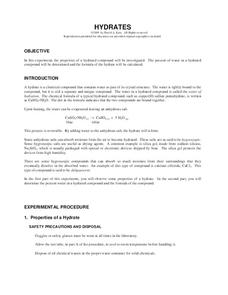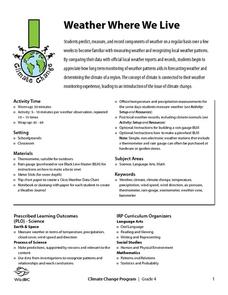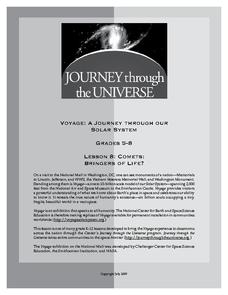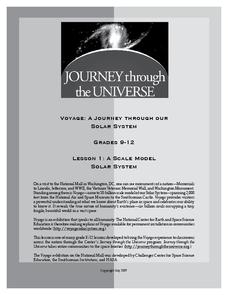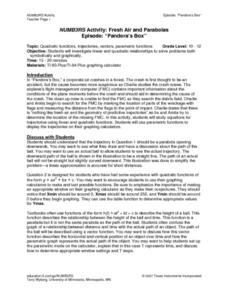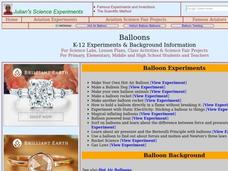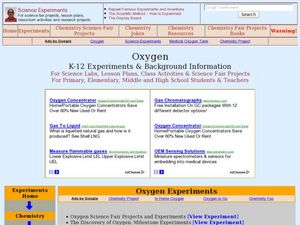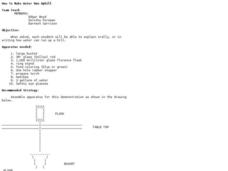Chymist
Hydrates
What occurs when a hydrate is heated? Lead your class in exploring the answer to this question as they investigate the properties of a hydrated compound. They heat copper(II) sulfate pentahydrate and evaporate the water byproduct to...
Wild BC
Weather Where We Live
Over a span of two weeks or more, mini meteorologists record weather-related measurements. What makes this particular resource different from others covering similar activities are the thorough details for the teacher and printables for...
Journey Through the Universe
Going through a Phase
Ignore the full moon, it's just a phase. Young scholars observe and record the moon during a full cycle before learning to predict future phases. Then the instructor leads a discussion on the other solar system objects that also go...
Journey Through the Universe
Comets: Bringers of Life?
Young scientists investigate the elements found in our solar system and then construct a model of a comet. They apply their new knowledge to the formation of the solar system.
Journey Through the Universe
A Scale Model Solar System
Between the time scientists discovered Pluto and reclassified it as a dwarf planet, it did not even make one full revolution around the sun. In two activities, scholars investigate scale models and their properties. Pupils find that it...
Curated OER
NUMB3RS Activity: Fresh Air and Parabolas
Explore parabolas and investigate linear and quadratic functions to solve problems symbolically and graphically. Also use parametric functions to display trajectories on a graphing calculator.
Pingry School
Solubility Product of an Ionic Compound
How do scientists determine when a solution is fully saturated? Scholars address the topic as they observe patterns of precipitation in various concentrations of ions. Using a well plate, pipette, and common chemicals, they collect data...
Colorado State University
Why Are Clouds White?
Is it possible to change the color of clouds? A three-part activity explores the scattering of light by the water droplets that make up clouds. After observing a demonstration, curious scholars conduct their own investigations of the...
Biology Junction
Strawberry DNA
Humans eat around 93,205 miles of DNA in an average meal. Scholars learn how to extract DNA from a strawberry using a presentation. It walks through each step and explains why the process works. Comprehension questions encourage...
National Wildlife Federation
Habitat Web
Young scientists weave together an understanding of ecosystems with this fun collaborative activity. Taking on the roles of different living and non-living elements of specific habitats, learners use a ball of yarn to create the web of...
Chymist
The Solubility of a Salt in Water at Various Temperatures
An educational activity allows young chemists to test the solubility of different types of salt at various temperatures. Groups create a graph using data from unsaturated, saturated, and supersaturated solutions.
LABScI
Viscosity: The Fluid Lab
There's more to fluids than meet the eye—they include gases, liquids, and polymers, too! Scholars complete three hands-on activities exploring different properties of fluids. They explore viscosity by measuring the resistance, or...
ARKive
Biodiversity and Evolution
Why is diversity in biology so important for an ecosystem? Explore biodiversity, evolution, and natural selection with a presentation for your biology class. It features clear information, activities for further understanding, and...
Bowels Physics
Impulse and Momentum
Be impulsive with your high school physics class. Emerging physicists review the slide presentation and learn about impulse, momentum, collisions, and how each variable may be affected. They complete practice problems and conclude with a...
Curated OER
Acid Rain: An Air Pollutant
Fifth graders participate in an experiment in which they examine the effects of acid rain on buildings. They discover how huge a problem acid rain is not only to structures but to the environment. They gather pictures of acid rain to...
Curated OER
100 Years of Flight
Students investigate Bernoulli's principle of air pressure and how it
relates to the lift of an airplane. Students identify various Aeronautical vocabulary terms. Students construct a paper glider and experiment with the control surfaces...
Curated OER
Lightning
Students study lightening and the history behind how it was used for electricity. In this electricity lesson plan students complete several experiments on the invention of the lightning rod.
Curated OER
A Bernoulli Levitator
Students examine the Bernoulli Principle. They explore how they can suspend an object in the air by blowing down on it.
Curated OER
Balloons
Students explore the different types of balloons. In this materials instructional activity students can complete several experiments including building their own hot air balloons, making balloon animals and experimenting with static...
Curated OER
Oxygen
Students explore oxygen and its physical and chemical propeties. In this investigative lesson students complete several experiments using oxygen.
Curated OER
How Do Airplanes Fly?
Students study the concepts of air pressure, air speed, and gravity as it relates to airplanes. In this how do airplanes fly lesson plan, students study the basics of flight. Then reinforce their fine motor skills by creating airplane...
Curated OER
The Lorax
Students read The Lorax and discuss how human actions can affect the environment. They conduct a simple experiment to see how much air pollution is in the air that they breathe.
Curated OER
The Power of Atmospheric Pressure Process
Students are introduced to the basic principles of atmospheric pressure. After watching demonstrations, they discover the capability of air pressure and how it affects weather. In groups, they use an inquiry template to solve different...
Curated OER
How to Make Water Run Uphill
Young scholars observe science demonstration. In this science instructional activity, students watch an experiment showing water moving up from an area of higher concentration to an area of lower concentration, due to a change in...


